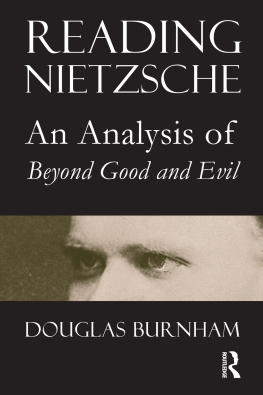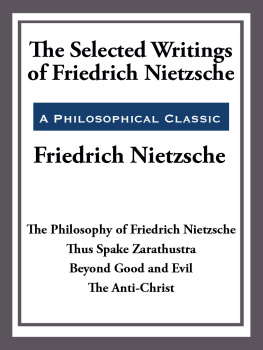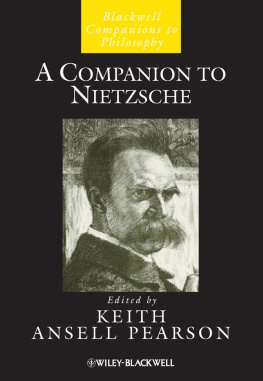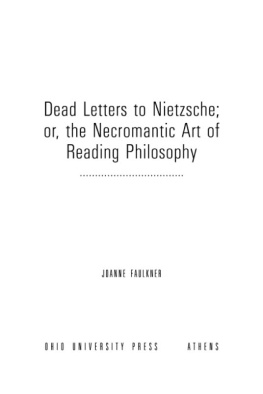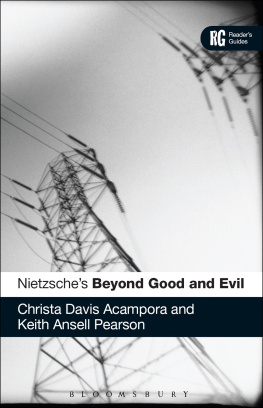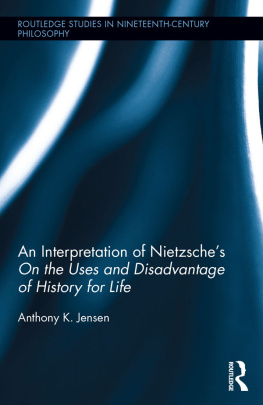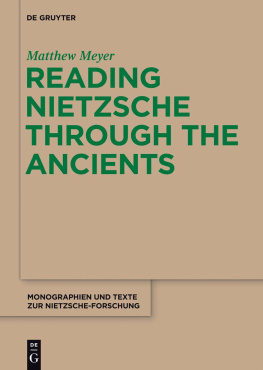Reading Nietzsche
Reading Nietzsche
An Analysis of Beyond Good and Evil
Douglas Burnham
First published 2007
by Acumen
Published 2014
by Routledge
2 Park Square, Milton Park, Abingdon, Oxon OX14 4RN
711 Third Avenue, New York, NY 10017, USA
Routledge is an imprint of the Taylor & Francis Group, an informa business
Douglas Burnham, 2007
This book is copyright under the Berne Convention.
No reproduction without permission.
All rights reserved. No part of this book may be reprinted or reproduced or utilised in any form or by any electronic, mechanical, or other means, now known or hereafter invented, including photocopying and recording, or in any information storage or retrieval system, without permission in writing from the publishers.
Notices
Practitioners and researchers must always rely on their own experience and knowledge in evaluating and using any information, methods, compounds, or experiments described herein. In using such information or methods they should be mindful of their own safety and the safety of others, including parties for whom they have a professional responsibility.
To the fullest extent of the law, neither the Publisher nor the authors, contributors, or editors, assume any liability for any injury and/or damage to persons or property as a matter of products liability, negligence or otherwise, or from any use or operation of any methods, products, instructions, or ideas contained in the material herein.
ISBN-13: 978-1-84465-074-3 (hardcover)
ISBN-13: 978-1-84465-075-0 (paperback)
British Library Cataloguing-in-Publication Data
A catalogue record for this book is available from the British Library.
Typeset in Garamond by Graphicraft Limited, Hong Kong.
In memory of my father, Hugh Danner Burnham
Contents
Beyond Good and Evil is among the most comprehensive of Nietzsche's works. No significant themes are missing, and the discussion of many topics is much more extensive (and often more "philosophical") than is found elsewhere. Beyond Good and Evil (let us just say Beyond ) is thus an ideal setting off point for understanding Nietzsche's thought in general. Moreover, its structure demands that we attempt to understand connections that are not always apparent in other works, and thus are often overlooked even in the literature on Nietzsche. I refer to the hidden relationships that run between Nietzsche's treatment of metaphysics, psychology, philosophical methodology, style, the project of a history and physiology of value, and political and social analysis. However, that Beyond is an ideal starting point for studying Nietzsche does not necessarily mean that it is the easiest of Nietzsche's books to understand; indeed, Nietzsche represented his own next book, Genealogy of Morality, as a "clarification" of Beyond. Beyond Good and Evil thus contains in miniature the considerable problem of reading Nietzsche in general: namely, reading him as at least akin to a systematic philosopher.
This book has two main aims. First, to be a helpful guide and introduction to Nietzsche, and particularly helpful for someone attempting to read Beyond Good and Evil. With it, readers should be able to "raise their game" and thus be able to approach both Beyond Good and Evil , and other books by Nietzsche, with perception and well-informed judgement. Secondly, it aims to be a contribution to the contemporary philosophical study of Nietzsche. This contribution lies in part in several careful analyses of individual concepts but, more important, in laying out how, across and throughout the compositional strategies of a single text, ideas and interconnections are elaborated. The result is not so much a commentary as the synthetic construction of Nietzsche's philosophical thought through a close reading of this great book.
This book aims to do just that: to provide a guide to the reading of a rich and complex text, while at the same time making the connections, and pulling out the key ideas and arguments, that will provide an excellent introduction to, as well as an analysis of, Nietzsche's thought as a philosophical whole. Beyond Good and Evil will serve as a pivot point, so to speak, around which we can usefully construct that bird's-eye picture of Nietzsche's work.
It should also be admitted that I am here completely indifferent to the truth or validity of Nietzsche's arguments or ideas. This is not because I think truth or validity are unimportant in philosophy; far from it. Nor is it because I simply agree with everything in Nietzsche. Rather, it is because of a preliminary task. Relatively few readers reach the point where such a judgement of truth or validity would be possible, for its precondition is that one understands the arguments and ideas, as well as the significance of how Nietzsche expresses them and what he might expect or hope that we do with them, in all their considerable richness and complexity. It is to this understanding that this book will be a contribution. Similarly, I have resisted the temptation as far as possible to update or rewrite Nietzsche's thought in a different philosophical language or system of thought, for example, the philosophical perspectives of anti-realism, moral naturalism, existentialism, "postmodernism", Bergsonism, and so on. Again, this is not because I am opposed to this kind of work; it is one of the key ways in which philosophy advances creatively. Rather, until one has reached the level of understanding described above, it seems essential to think using Nietzsche's own concepts and forms of expression.
Accordingly, this book has a straightforward structure. It proceeds through all the Parts and sections, in order. In order to ensure that the result is less Byzantine than Nietzsche's original, there are a number of additional elements. First, there is throughout considerable cross-referencing, which should help a synthetic image of the work to emerge. Secondly, a number of sections are picked out as appropriate places for a considerably more sustained and philosophically productive discussion of a particular theme; for example, near the beginning, the notions of perspective and interpretation. These sections are listed in the contents. Thirdly, I have introduced one piece of terminology - "realignment" - to stand for a notion that is present in Nietzsche but for which he does not have a consistent word. Fourthly, there are outside the main text items of textual apparatus (such as a short glossary) integral to the introductory side of this book's purpose.
Again, Beyond is very comprehensive, and I therefore wish to let it speak for itself, rather than provide here a large introduction or overview of Nietzsche's life and works. However, Nietzsche is a very easy philosopher to read poorly, and singularly difficult to read well. Because of the ease, his writings have been bestsellers for more than a century; but because of the difficulty, misconceptions or oversimplifications about Nietzsche have also been bestsellers. So, let us begin by rehearsing a few of these.
- Without a doubt, decades after his death, Nietzsche was taken to heart by National Socialism. To do so, however, the Nazis had to edit out or simply ignore the many passages where Nietzsche pours scorn on both German nationalism and upon anti-Semites.
- Again, Nietzsche is often considered an advocate of a radical individualism in the same mould as popular existentialism. To read him in this way, one has to ignore passages like 17 in the present book where Nietzsche argues that the "I" or the individual thinking and acting subject is not fundamental in his philosophy, but is rather a derivative effect.

